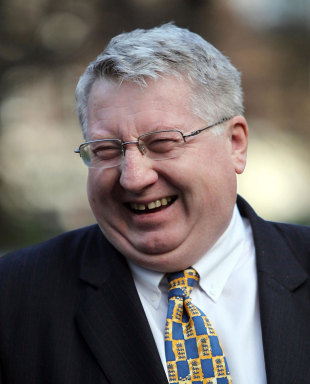- England's Pietersen dilemma
ECB chief Collier apologises over Pietersen remarks

David Collier, the ECB chief executive, has apologised for suggesting that South African players "provoked" Kevin Pietersen into sending the messages that led to the player being dropped from the England team.
Pietersen was omitted from the England team for the third Test of the series between England and South Africa in August after it emerged he had sent messages containing inappropriate comments about the England captain, Andrew Strauss, to members of the South Africa touring party. Pietersen was subsequently omitted from England's World T20 squad and their squad for the Test tour of India, though he is now undergoing a "reintegration" process that could see him return to the side shortly.
Just as it seemed the matter was close to resolution, however, Collier gave a live radio interview with the BBC on October 7 in which he claimed Pietersen had been reacting to messages from members of the South Africa team and that the episode may have been orchestrated to disrupt the England dressing room.
Asked about the context of the messages sent from Pietersen to members of the South Africa touring party, Collier replied: "These were responses to messages from certain members of the South Africa team and I would not condone an England player doing it if it was the other way around, and I certainly think they provoked the situation. There was definitely a policy that was happening but we shouldn't blame the South Africans, we should be above that. I think there was a tactic which was used. I think that is sadly some of the ways of modern sport."
The comments angered Cricket South Africa (CSA) and the South Africa Cricketers' Association (SACA). The acting chief executive of the former, Jacques Faul, expressed his "disappointment", while SACA demanded an apology. While it is clear that the ECB and CSA do not agree on all the details of the episode, they have now released a joint statement making it clear that Collier has apologised for his comments and underlined the respect the ECB has for the "highest ethical standards of behaviour" observed by South Africa players:
"CSA and ECB have discussed the events which led to Kevin Pietersen's non-selection for the third test," the statement said.
"Cricket South Africa has made clear to ECB that the electronic messages were not part of any initiative or plan to undermine the England team or players. ECB has unreservedly accepted that assurance and wishes to reiterate that it has no issue at all with CSA - or the Proteas players - on this matter and appreciates that the South African and England players follow the highest ethical standards of behaviour.
"Although the two boards do not agree on the sequence of events regarding any responses to messages between Kevin Pietersen and certain Proteas players, CSA and SACA accept Mr Collier's apology based upon his earlier utterances that the team may have acted in a way which was underhand. Both CSA and ECB regard this matter as now closed and will not comment on the confidential information shared in discussion between the boards."
The episode is an embarrassment to the ECB and may well lead to questions about Collier's future. But, while Collier will forever be tainted by his involvement with the Stanford debacle, his record as CEO is, on the whole, good. The England team have climbed the rankings in all formats since he was appointed in 2004 and the ECB has gone from a position of poverty to boasting a surplus of more than £20m.
Furthermore, the ECB leads the way in the funding of women's and disability cricket, while huge sums - in excess of £30m a year - have been invested in grassroots cricket and the numbers of people playing the game has doubled. He was close to being appointed CEO of the ICC earlier this year, but missed out to former South Africa wicketkeeper Dave Richardson.
The issue will do little to improve relations between the ECB and Pietersen, though. While Collier has previously admitted that the ECB has never seen the messages, which were reported to be deleted some weeks ago, they have received a "binding assurance" from Pietersen that they were not derogatory of Strauss and did not contain tactical advice. It seems they also accepted, at the time, that they were sent in response to messages from South Africa players.
George Dobell is a senior correspondent at ESPNcricinfo

